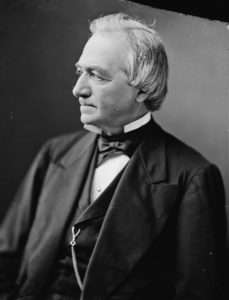The Volokh Conspiracy
Mostly law professors | Sometimes contrarian | Often libertarian | Always independent
Today in Supreme Court History: March 23, 1870
3/23/1870: Justice Joseph Bradley takes oath.

Editor's Note: We invite comments and request that they be civil and on-topic. We do not moderate or assume any responsibility for comments, which are owned by the readers who post them. Comments do not represent the views of Reason.com or Reason Foundation. We reserve the right to delete any comment for any reason at any time. Comments may only be edited within 5 minutes of posting. Report abuses.
Please to post comments


Comcast Corp. v. National Ass'n of African American-Owned Media, 589 U.S. --- (decided March 23, 2020): owner of African-American owned network must show that race was related to being denied a spot on cable TV service ("but-for" causation); remands to examine Complaint under proper standard
Reno v. Flores, 507 U.S. 292 (decided March 23, 1993): upholding against Due Process attack INS regulation prohibiting release of juvenile aliens if no family member or guardian to claim them (plaintiffs were teenagers suspected of being deportable who were not being released)
Allen v. Cooper, 589 U.S. --- (decided March 23, 2020): Congress has no power to abrogate Eleventh Amendment immunity as to copyright violations (state posted plaintiff's videos of shipwreck; Court strikes down relevant section of Copyright Remedy Clarification Act of 1990)
Lynch v. Household Finance Corp., 405 U.S. 538 (decided March 23, 1972): Anti-Injunction Act (28 U.S.C. §2283) did not prevent federal court from staying on Due Process grounds pre-suit garnishment of wages permitted by state law; no "state proceeding" in existence yet
Goldberg v. Kelly, 397 U.S. 254 (decided March 23, 1970): state can't terminate welfare benefits without hearing
Ex Parte Young, 209 U.S. 123 (decided March 23, 1908): state can't (without a hearing) set rates so high that railroads would be forced to go to court to contest them
Kahler v. Kansas, 589 U.S. --- (decided March 23, 2020): upholding against Eighth Amendment attack Kansas statute prohibiting insanity defense as to guilt (can be asserted only as to sentencing)
South Florida Water Mgmt. District v. Miccosukee Tribe of Indians, 541 U.S. 95 (decided March 23, 2004): tribe protested pollution due to pumping water from Everglades pond without special permit; Court remands to trial court for proper analysis
Kumho Tire Co. v. Carmichael, 526 U.S. 137 (decided March 23, 1999): in this series of summaries, about 1,400 so far, this is one of the handful of cases (and I have small hands) I already knew and could write a summary of without having to (re)read it; Daubert rule (that expert testimony must be based on reliable principles reliably applied) also applies to non-scientific testimony (expert testifying as to cause of tread wear pattern on allegedly defective tire could not determine how many miles it had been driven)
Lyng v. International Union, United Automotive, Aerospace and Agricultural Implement Workers of America, 485 U.S. 360 (decided March 23, 1988): upholding against First Amendment and Fifth Amendment attack Reagan-era rule cutting off welfare benefits if one member of the household had job but was on strike
My state follows what I think is the majority rule on insanity: it is a complete defense, not a sentencing factor. We may be unusual in requiring proof of sanity beyond a reasonable doubt once the defense is raised. The state Supreme Court deliberately avoiding describing the rule as a presumption of sanity.
Why do they call it the Supreme Judicial Court? Is there another Supreme Court there that’s not judicial? A Supreme Tennis Court, for example?
The General Court makes the laws, the Judicial Court applies the laws.
Thanks! So there is a real reason.
Kumho: Would they have accepted Mona Lisa Vito's testimony?
As I recall, she was qualified to testify about suspensions of different model years and how they would affect tire tracks at the murder site. If this is not changed by the number of miles driven, or the state of repair or disrepair, my guess is her testimony would be accepted. Particularly because she was so cute, especially the way she wrapped her lips around those f-bombs.
She was qualified to testify on "General automotive knowledge."
Among other things, Bradley was the 15th member of the commission that decided the 1876 election and made Rutherford B. Hayes President. He dissented in the Slaughterhouse Cases but wrote the decision in the Civil Rights Cases.